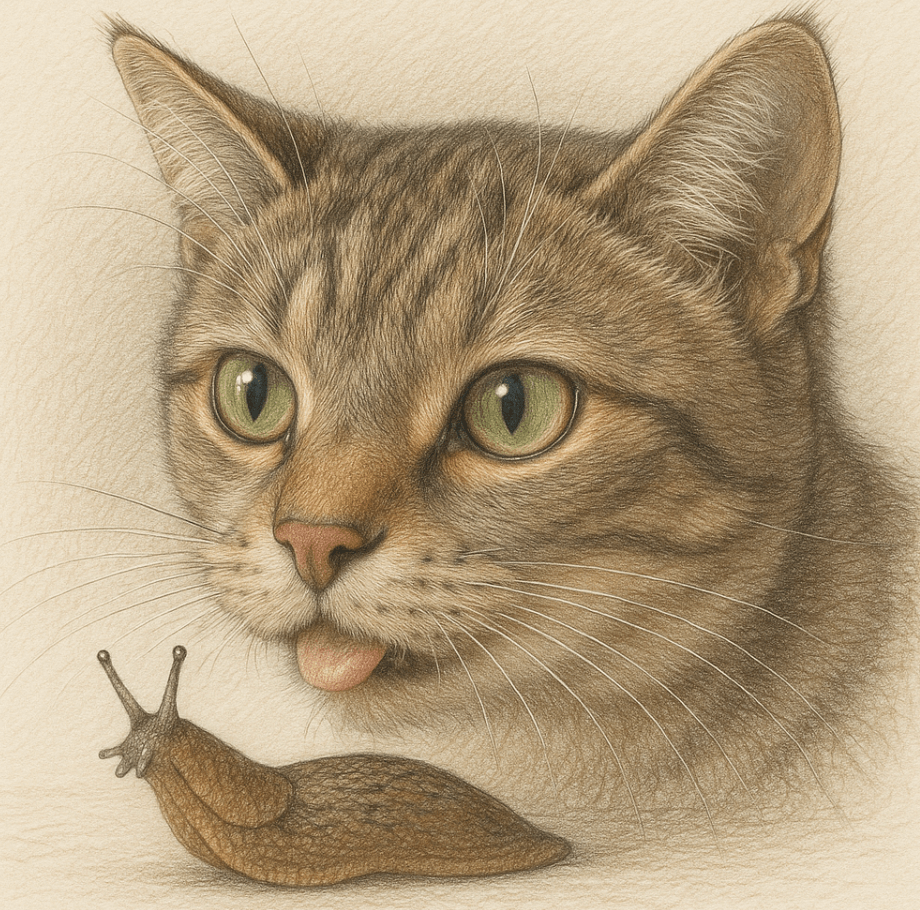Can Cats Eat Slugs?
Cats are curious creatures, and their natural hunting instincts often lead them to explore the world around them—sometimes in unexpected ways. If you’ve ever caught your feline friend batting at or even nibbling on a slug, you might wonder whether this behavior is safe. While slugs may seem harmless, they can pose risks to cats depending on the circumstances. Understanding what happens if your cat eats a slug, potential dangers, and how to prevent such incidents is crucial for keeping your pet healthy and happy. In this blog post, we’ll dive into everything you need to know about cats and slugs, from their dietary habits to expert advice on ensuring your cat’s well-being.
Potential Risks of Cats Eating Slugs
While cats are obligate carnivores and not naturally inclined to eat slugs, curiosity or boredom may lead them to ingest these slimy creatures. Unfortunately, slugs can carry parasites, toxins, and other hazards that may harm your cat. Here are some risks to be aware of:
Parasitic Infections:
Slugs can harbor lungworm larvae, which can infect cats and lead to respiratory issues if ingested.Toxic Substances:
Slugs may have been exposed to pesticides or slug pellets in gardens, which can poison your cat if consumed indirectly.Digestive Upset:
The slime coating on slugs can irritate your cat’s stomach, potentially causing vomiting or diarrhea.Choking Hazard:
Although rare, larger slugs could pose a choking risk if swallowed whole or without proper chewing.Allergic Reactions:
Some cats may have sensitivities to proteins or substances found in slugs, triggering allergic responses.
These risks highlight why it’s important to monitor your cat’s outdoor activities and discourage them from eating slugs.
Signs Your Cat May Have Eaten a Slug
If you suspect your cat has eaten a slug, look out for these warning signs that indicate they may be experiencing discomfort or health issues. Early detection can help prevent complications.
Coughing or Wheezing:
These symptoms may suggest a parasitic infection like lungworm affecting their respiratory system.Vomiting or Diarrhea:
Digestive upset is a common reaction to ingesting something unusual or harmful, such as a slug.Lethargy or Weakness:
A sudden lack of energy could signal poisoning or an internal issue caused by consuming a slug.Loss of Appetite:
Refusing food is often a red flag that your cat is feeling unwell after eating something unsafe.Excessive Drooling:
Drooling can occur if the slime from the slug irritates your cat’s mouth or throat.
Recognizing these signs early allows you to act quickly and seek veterinary care if necessary.
Check this guide 👉Can Cats Eat Vegetable Oil? Best 7 Expert Tips!
Check this guide 👉Can Cats Eat Acai? Best 7 Expert Tips!
Check this guide 👉Can Cats Eat Jackfruit? Best 7 Expert Tips!

How to Prevent Your Cat from Eating Slugs | What to Do If Your Cat Eats a Slug |
|---|---|
Supervise outdoor playtime closely | Monitor for symptoms like coughing or vomiting |
Keep your garden free of slug bait or pellets | Contact your veterinarian immediately |
Provide engaging indoor toys to reduce boredom | Avoid inducing vomiting unless advised by a vet |
Create barriers to limit access to damp areas | Offer fresh water to flush out toxins |
Train your cat to avoid slugs using positive reinforcement | Note any changes in behavior or appetite |
Safe Alternatives to Satisfy Your Cat’s Hunting Instincts
Instead of letting your cat hunt slugs, there are safer ways to satisfy their natural instincts while keeping them entertained and engaged.
Interactive Toys:
Feathers, strings, and laser pointers mimic prey movements, providing mental and physical stimulation.Puzzle Feeders:
These toys dispense treats or kibble, encouraging problem-solving and reducing boredom.Catnip-Filled Mice:
Soft, plush toys infused with catnip can entice your cat to “hunt” without real-world risks.Supervised Outdoor Time:
Use a harness and leash to let your cat explore safely, minimizing exposure to harmful critters like slugs.Indoor Enrichment Activities:
Build obstacle courses or hide treats around the house to channel their energy constructively.
By offering these alternatives, you can redirect your cat’s instincts toward safer and more enjoyable pursuits.
Steps to Take if You Find a Slug in Your Garden
If you share your outdoor space with slugs, taking proactive measures can protect both your plants and your pets. Here’s how to manage slugs effectively while safeguarding your cat.
Remove Slugs Manually:
Pick slugs off plants by hand (wear gloves) and relocate them far from your garden.Use Pet-Safe Slug Control Methods:
Opt for natural deterrents like copper tape, diatomaceous earth, or beer traps instead of toxic chemicals.Encourage Natural Predators:
Attract birds, frogs, or hedgehogs to your garden, as they naturally prey on slugs.Maintain a Clean Yard:
Remove debris, leaves, and standing water where slugs thrive to reduce their population.Create Physical Barriers:
Install mesh screens or fencing around vulnerable areas to keep slugs away from your cat’s favorite spots.
With these strategies, you can create a slug-free environment that prioritizes your cat’s safety.
Common Misconceptions About Cats and Slugs
There are several myths surrounding cats and slugs that can lead to misunderstandings about their interactions. Clearing up these misconceptions helps you make informed decisions.
Myth: Cats Know What’s Safe to Eat:
While cats instinctively avoid certain foods, curiosity can override caution, leading them to ingest harmful items like slugs.Myth: Slugs Are Harmless Creatures:
Though small, slugs can carry parasites and toxins that pose serious risks to cats.Myth: Indoor Cats Can’t Encounter Slugs:
Slugs can find their way indoors through open windows, doors, or potted plants, so vigilance is still necessary.Myth: All Gardens Are Safe for Cats:
Gardens treated with slug pellets or pesticides can endanger cats who explore or ingest contaminated slugs.Myth: A Single Slug Won’t Hurt My Cat:
Even one slug can carry enough parasites or toxins to cause harm, so prevention is always best.
Understanding these truths ensures you’re better equipped to protect your cat.
Health Conditions Linked to Slug Ingestion in Cats
Ingesting slugs can lead to various health issues in cats, some of which require immediate attention. Being aware of these conditions helps you recognize symptoms early.
Lungworm Infection:
Caused by ingesting slugs carrying larvae, this condition affects the respiratory system and requires prompt treatment.Gastroenteritis:
The slime from slugs can irritate the digestive tract, causing inflammation and discomfort.Poisoning:
Exposure to slug pellets or pesticides can result in toxicity, manifesting as seizures, tremors, or excessive salivation.Dehydration:
Vomiting or diarrhea caused by slug ingestion can lead to dehydration, necessitating fluid therapy.Allergic Dermatitis:
Skin irritation may occur if your cat comes into contact with slug slime, requiring bathing and soothing treatments.
Early intervention is key to managing these potential health concerns effectively.
How to Safely Introduce Outdoor Exploration to Your Cat
If you want to let your cat enjoy the outdoors without encountering slugs or other hazards, follow these guidelines to create a secure and enriching experience.
Use a Cat Enclosure:
Catio systems or enclosed outdoor spaces allow your cat to explore safely while preventing access to slugs and other dangers.Teach Recall Commands:
Train your cat to come when called, giving you greater control during supervised outdoor sessions.Provide Distractions:
Bring along toys or treats to keep your cat focused and less likely to chase slugs or other pests.Inspect the Area First:
Before letting your cat roam, check the yard for slugs, slug bait, or other hazards that need removal.Limit Outdoor Time:
Short, supervised outings reduce the chances of your cat encountering slugs or getting into trouble.
By following these steps, you can ensure your cat enjoys the outdoors safely and responsibly.
Frequently Asked Questions About Cats and Slugs
Are slugs poisonous to cats?
Slugs themselves aren’t inherently toxic, but they can carry parasites or toxins from pesticides, making them dangerous if ingested.
What should I do if my cat eats a slug?
Monitor your cat for symptoms and consult your veterinarian promptly, especially if you notice signs of illness.
Can slugs transmit diseases to cats?
Yes, slugs can carry lungworm larvae, which can infect cats and cause respiratory problems if left untreated.
How can I stop my cat from hunting slugs?
Distract your cat with toys, supervise outdoor time, and use training techniques to discourage slug hunting.
Are there benefits to letting my cat hunt slugs?
No, the risks outweigh any perceived benefits; it’s better to provide safe alternatives for satisfying their hunting instincts.
Prioritizing Your Cat’s Health Around Slugs
While cats are naturally curious and love to explore, it’s up to us as responsible pet owners to ensure their adventures don’t put them at risk. Slugs may seem insignificant, but they carry hidden dangers that can impact your cat’s health. By staying informed, taking preventive measures, and seeking veterinary care when needed, you can keep your furry friend safe and thriving. Remember, a little vigilance goes a long way in maintaining a happy and healthy relationship with your beloved companion.
Can a Cat Be Tested for Rabies? Best 7 Expert Tips! – Learn if testing is possible, understand the process, and discover prevention tips to keep your cat safe from rabies.
Can a Dog Be Tested for Rabies? Best 7 Expert Tips! – Learn how rabies testing works, why it’s critical, and what every dog owner needs to know.
Best Vegetables for Cat Food: Best 7 Expert Tips! – Discover safe, nutritious veggies to boost your cat’s diet, support digestion, and enhance overall health naturally.
Best Vegetables for Dog Food: Best 7 Expert Tips! – Discover safe, nutritious veggies to boost your dog’s diet, support digestion, and enhance overall health naturally.




